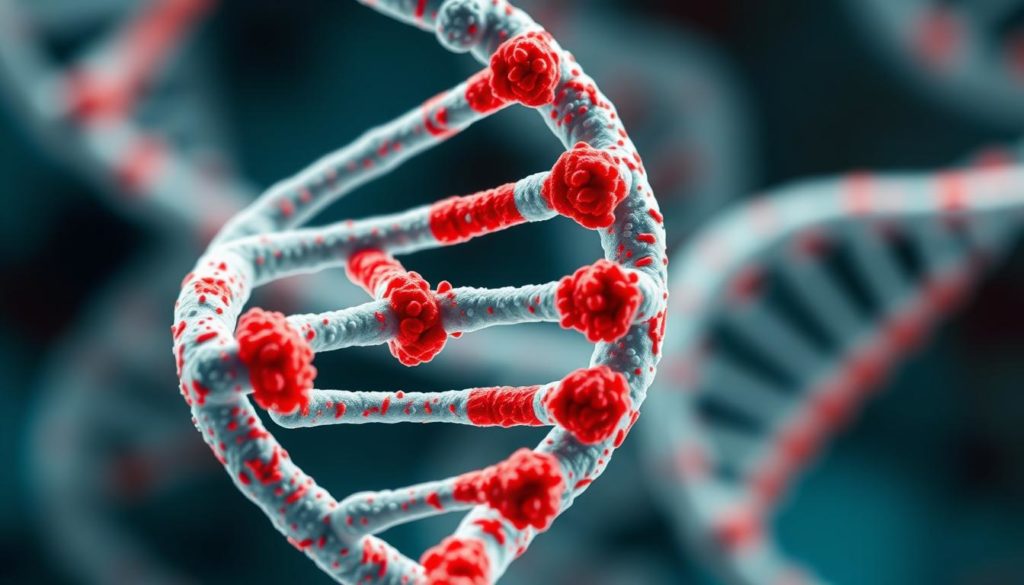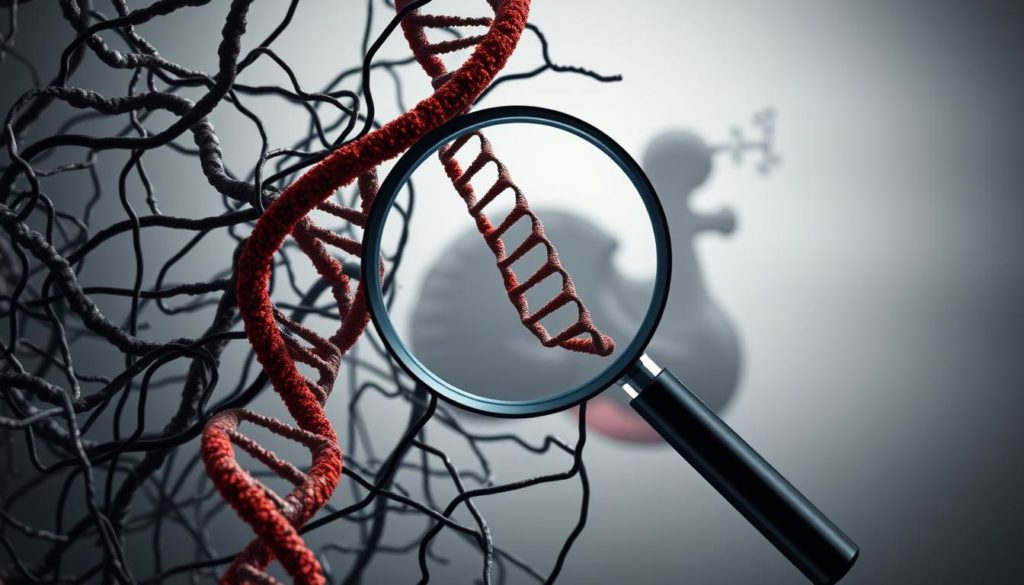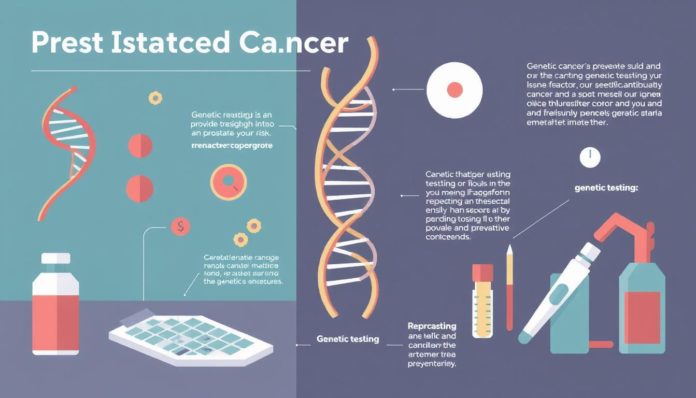Knowing how DNA affects prostate cancer can save lives. Genetic tests for prostate cancer risk find genes like BRCA1 and BRCA2 that raise the risk. These tests are key for early detection and treatment.
Tests look at common mutations like BRCA1 and BRCA2 that increase risk. Knowing your genetic risk helps with early screenings and better treatment plans. This leads to more effective prevention and therapies for those at higher risk.
Take control of your health by learning about genetic mutations. See how genetic tests help in prevention and treatment. It’s a vital tool in fighting prostate cancer.
Introduction to Genetic Testing for Prostate Cancer
Genetic testing is now key in understanding prostate cancer risk. It looks at genetic mutations to help spot potential cancer risks early. This way, people can take steps to protect their health.

Understanding Genetic Mutations
Genetic changes, especially those passed down from parents, can raise prostate cancer risk. Mutations in genes like BRCA1 and BRCA2 are linked to breast cancer but also increase prostate cancer risk. By looking at these changes, doctors can catch cancer early and offer better treatment options.
Types of Genetic Tests
There are different tests for prostate cancer genetic screening. Some look at many genetic changes, while others focus on specific ones linked to family history or ethnicity. These tests help create personalized risk assessments for prostate cancer.
Role of DNA in Prostate Cancer
DNA is vital in understanding prostate cancer. It carries the instructions for cell behavior, and changes in it can lead to cancer. So, DNA is key to fighting prostate cancer risk.
Inherited Gene Mutations and Prostate Cancer
Genetic mutations are key in prostate cancer development. They help in better surveillance and tailored treatments. BRCA1 and BRCA2 are major culprits in inherited gene mutations.

BRCA1 and BRCA2 Mutations
BRCA1 and BRCA2 are linked to breast and ovarian cancers. They also increase prostate cancer risk in men. These mutations can lead to cell repair issues, allowing cancer cells to grow. Men with these mutations are more likely to get prostate cancer early.
Other Gene Mutations (CHEK2, ATM, PALB2, etc.)
Mutations in genes like CHEK2, ATM, and PALB2 are also tied to prostate cancer. They can harm DNA repair pathways, leading to cancer. Finding these mutations can help in targeted treatments and screenings for those at risk.
Lynch Syndrome and Prostate Cancer
Lynch Syndrome, or hereditary non-polyposis colorectal cancer (HNPCC), comes from DNA mismatch repair gene mutations. It greatly raises cancer risks, including prostate cancer. Knowing about Lynch Syndrome means taking early steps against prostate and other cancers.
| Gene Mutation | Associated Cancer Risks |
|---|---|
| BRCA1 and BRCA2 | Breast, Ovarian, Prostate |
| CHEK2 | Prostate, Colorectal, Breast |
| ATM | Prostate, Breast |
| PALB2 | Breast, Pancreatic, Prostate |
| Lynch Syndrome | Colorectal, Endometrial, Prostate |
Genetic Testing Prostate Cancer Risk
Genetic testing for prostate cancer risk helps both individuals and doctors make better choices. By looking at Genetic Markers for Prostate Cancer, we can learn about our risk. This knowledge lets us take steps to prevent the disease.
With Prostate Cancer Genetic Testing Options, people can understand their genetic risks better. Tests can find specific genetic markers. This shows how likely someone is to get the disease. It helps in making plans to prevent or treat it.
There are many ways to test for prostate cancer risks today. Let’s look at some of these options:
| Testing Option | Description | Advantages | Considerations |
|---|---|---|---|
| Single Gene Testing | Focuses on specific gene mutations known to increase prostate cancer risk. | Highly targeted, accurate for known mutations. | Limited to selected genes, not comprehensive. |
| Multi-Gene Panel Testing | Tests multiple genes simultaneously to provide a broader risk profile. | Comprehensive, covers a wider range of potential mutations. | More complex, may yield variants of unknown significance. |
| Whole Exome Sequencing (WES) | Examines all coding regions of the genome. | Extremely thorough, can detect rare mutations. | Expensive, data-intensive, longer processing times. |
| Genomic Profiling | Analyzes a set of genetic alterations in the tumor. | Helps in determining targeted therapy options. | Primarily used for those already diagnosed with cancer. |
Choosing the right Prostate Cancer Genetic Testing Options depends on many things. These include family history, health, and advice from genetic counselors. It’s important to work with doctors and counselors to understand test results and what they mean.
Prostate Cancer Genetic Screening: Who Should Get Tested?
Knowing who needs genetic testing for prostate cancer is key to catching it early. There are clear guidelines to help people decide if they should get tested.
Criteria for Genetic Testing
Doctors usually suggest genetic testing for those with a family history or certain gene mutations. The main criteria are:
- Presence of breast, ovarian, or pancreatic cancer in the family
- Multiple family members with prostate cancer
- Prostate cancer diagnosed at a young age in the family
Family History and Genetic Risk
A strong family history of cancer ups the chance of genetic mutations. Genetic tests can spot those at risk early. This means they can start screenings sooner.
Consulting a Genetic Counselor
Talking to a genetic counselor is a big step. They help make sense of family history, explain genetic test results, and guide you in making choices. Their advice helps understand what comes next after a genetic test.
How Genetic Testing is Performed
Genetic testing is key in understanding and managing prostate cancer risk. It looks at an individual’s DNA to see if they have certain mutations. These mutations might make them more likely to get prostate cancer. This part explains how DNA testing works for prostate cancer risk and the process of prostate cancer genetic screening.
Sample Collection Methods
There are a few ways to get samples for genetic testing. The main methods are:
- Blood samples
- Saliva samples
- Cheek swabs (buccal swabs)
Each method helps get DNA, which is important for finding genetic changes linked to prostate cancer risk.
Laboratory Analysis
After getting a sample, it goes to a lab for testing. In the lab, they take DNA from the sample and look for specific genetic markers and mutations. This helps find genes that might make someone more likely to get prostate cancer.
Types of Genetic Test Results
Genetic testing can give different results. These include:
- Positive results: Show a mutation linked to a higher prostate cancer risk.
- Negative results: No big mutations found, so the risk of prostate cancer is normal.
- Inconclusive results: These results are unclear and don’t give clear info on risk.
- Variants of Unknown Significance (VUS): These are genetic changes where we don’t know how they affect cancer risk yet.
Knowing these results helps doctors make better decisions and decide if family members should also get tested.
Implications of Genetic Test Results
Genetic tests for prostate cancer give important insights. They affect both the person and their family. The results can guide health decisions and treatment options. Let’s look at how to understand these test results.
Positive Results and Risk Reduction Steps
A positive test may show genes linked to higher risk. This info helps people take steps to lower their risk. They might get regular check-ups or consider surgery to prevent cancer.
Some may also look into special treatments like PARP inhibitors. These are for people with certain gene changes.
Negative and Inconclusive Results
Negative tests can be reassuring but don’t mean no risk exists. Not all genes are found by tests, and other things can also raise cancer risk. Tests that don’t give clear results or show unknown changes are tricky.
It’s important to talk to genetic counselors to understand these results. They can help make sense of them.
Variants of Unknown Significance (VUS)
VUS results are hard because we don’t know what they mean yet. Genetic counseling is key in these cases. It helps patients and families understand the possible effects.
For clear guidance, genetic counseling for prostate cancer risk is very helpful. You can find more about it here.
Knowing what genetic tests show, whether it’s good, bad, or unclear, helps people make smart health choices. It lets them plan better for their health.
Prostate Cancer Genetic Testing Options
Understanding Prostate Cancer Genetic Screening is key to managing your health. There are many genetic tests available, each giving different insights into your risk. These tests can focus on specific genes or check a wide range of genetic variations.
Choosing the right Prostate Cancer Genetic Testing Options depends on your health history and family background. Your ethnicity and any past cancer diagnoses also play a role. This helps doctors pick tests that will give you the most useful results for your health care.
Here’s a look at the different genetic tests you can get:
| Testing Option | Focus Area | Ideal Candidates | Coverage |
|---|---|---|---|
| Targeted Gene Panels | High-Risk Mutations (BRCA1/2, etc.) | People with family history of prostate or related cancers | Narrow Focus, High Specificity |
| Comprehensive Panels | Multiple Gene Mutations | Individuals without specific family history | Broad Coverage, Moderate Specificity |
| Single Gene Testing | Specific Gene (e.g., BRCA2) | Known family mutation carriers | Very Specific, Limited Scope |
| Whole Genome Sequencing | Entire Genetic Makeup | Individuals seeking extensive genetic information | Most Comprehensive, Broadest Scope |
Talking to a healthcare provider is important when choosing Prostate Cancer Genetic Testing Options. They can help you pick the best test for your situation. This way, you can make informed choices about your health and treatment.
The Role of Genetic Counseling in Prostate Cancer
Genetic counseling is key in understanding prostate cancer. It helps patients and families through a complex process. This includes support at every stage.
Pre-Test Counseling
Prostate Cancer Genetic Counseling starts with pre-test counseling. Here, genetic counselors explain the results of genetic tests. They help patients make informed choices by looking at their Family History and Genetic Risk.
Post-Test Interpretation
After getting test results, post-test counseling is crucial. It makes the results easy to understand. This helps patients see how their Family History and Genetic Risk affects their health and treatment options.
Family Communication and Support
Facilitating family talks is a big part of Prostate Cancer Genetic Counseling. Counselors help with strategies for discussing genetic risks and test results. This encourages family members to take care of their health.
Genetic Markers for Prostate Cancer: What You Need to Know
The discovery of genetic markers for prostate cancer has changed how we manage this disease. Mutations in genes like BRCA1, BRCA2, and Lynch Syndrome genes are key. They help us understand risks and tailor treatments.
Knowing these genetic markers helps in diagnosing and creating personalized treatment plans. This improves patient outcomes.
Key Genetic Markers
Important genetic markers include BRCA1, BRCA2, CHEK2, ATM, and Lynch Syndrome mutations. These genes affect the risk of getting prostate cancer. Men with these mutations are more likely to get the disease. So, they need early screening and monitoring.
Impact on Treatment Options
The discovery of genetic markers for prostate cancer changes treatment options. For example, men with BRCA mutations might use PARP inhibitors. These are targeted therapies for cancers with these genes. Knowing your genetic profile helps doctors create better treatment plans. This reduces side effects and improves survival rates.
Future Directions in Genetic Research
Future research aims to find new genetic markers for early detection and tracking disease progression. With genetic research, we expect new treatments that will make care more personalized and effective. Studying genetic variations promises to improve our understanding and management of prostate cancer.
| Genetic Marker | Associated Risk | Impact on Treatment |
|---|---|---|
| BRCA1 | High | PARP Inhibitors |
| BRCA2 | Very High | PARP Inhibitors |
| CHEK2 | Moderate | Customized Screening |
| ATM | High | Targeted Therapy |
| Lynch Syndrome | High | Regular Surveillance |
Prostate Cancer Risk Assessment Test: Tools for Prevention and Early Detection
Knowing your risk for prostate cancer is key to preventing it and catching it early. The Prostate Cancer Risk Assessment Test helps identify those at higher risk. It uses genetic tests and other tools to create personalized health plans. This approach is changing the way we fight prostate cancer.
These risk assessment tools are great at finding cancer early. Catching prostate cancer early means better treatment and higher survival rates. With the right tools for prevention and early detection, people can make smart health choices and prevent problems.
It’s important to know about these tests and get access to them. The Prostate Cancer Risk Assessment Test helps people understand their genetic risks and talk to doctors for the best care. Adding these tests to regular health checks can lead to finding cancer early and reducing its impact.
FAQ
What is the purpose of genetic testing for prostate cancer risk?
Genetic testing looks for gene mutations that might make someone more likely to get prostate cancer. It helps find the disease early, plan prevention or treatment, and tailor healthcare for those affected.
Which gene mutations are commonly tested to assess prostate cancer risk?
Tests usually check for BRCA1 and BRCA2 genes, which are linked to higher prostate cancer risk. Other genes like CHEK2, ATM, PALB2, and Lynch Syndrome genes are also checked.
How is genetic testing for prostate cancer performed?
Testing involves taking a blood, saliva, or cheek swab sample. Then, a lab analyzes it for specific gene mutations linked to prostate cancer risk. The test can be broad or focused, based on your and your family’s health history.
Who should consider getting genetic testing for prostate cancer?
People with a family history of prostate or related cancers, or those from high-risk groups (like Ashkenazi Jewish with BRCA mutations), should think about testing. Genetic counseling can help decide if testing is right for you.
What do the results of genetic testing mean?
Test results can be positive, negative, unclear, or show a Variant of Unknown Significance (VUS). Positive results mean a higher risk and suggest steps to take. Negative results offer some reassurance but don’t rule out all risks. Unclear or VUS results need careful review with genetic counselors.
How can genetic testing influence prostate cancer treatment options?
Genetic testing can guide treatment choices, like using targeted therapies like PARP inhibitors. Knowing your genetic makeup helps tailor treatment for better results.
What role do genetic counselors play in the genetic testing process?
Genetic counselors are key for explaining the test before it’s done and what the results might mean. They help interpret results, support in sharing them with family, and help make health decisions.
Are there different types of genetic tests for prostate cancer risk?
Yes, there are tests that focus on specific high-risk genes and others that check many genes. The right test depends on your and your family’s health history, ethnicity, and any previous cancer diagnoses.
What are the key genetic markers for prostate cancer risk?
Important genetic markers include BRCA1, BRCA2, and genes related to Lynch Syndrome. These genes greatly affect prostate cancer risk and guide treatment choices.
What are the sample collection methods for genetic testing?
For genetic testing, samples are usually taken through blood, saliva, or a cheek swab. These samples are then checked in a lab for genetic mutations linked to prostate cancer risk.
What are the limitations of genetic testing for prostate cancer?
Genetic testing doesn’t find all mutations that could raise prostate cancer risk. Negative tests don’t mean no risk exists, and unclear results can be hard to understand. Genetic counselors are key in explaining these limits and what the results mean.


